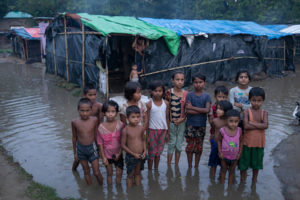After Bangladesh and Myanmar officials met in Dhaka in late October, they announced that they had developed a concrete plan to begin repatriation in mid-November, with the first round to include 2,260 Rohingya from 485 families. Starting on November 15, 150 refugee would be received each week at the Nga Khu Ya reception center before being transferred to the Hla Poe Kaung transit camps. Bangladesh — likely anxious to begin repatriations in advance of upcoming national elections scheduled for late December — culled the names of returnees at random, without consulting the refugees to confirm their willingness to return or to have their names shared with Myanmar.
Luckily, this move sparked international condemnation from the U.N., human rights groups and governments alike. As UNHCR spokesman, Andrej Mahecic put it, “Because we consider that conditions in Rakhine state are not yet conducive for voluntary return in the conditions of safety,dignity and sustainability, UNHCR will not, at this stage, facilitate any refugee returns to Rakhine state.” Ultimately, Bangladesh and Myanmar agreed to postpone return and repatriation until 2019. But that doesn’t mean the Rohingya are out of danger.
The Myanmar government has done nothing to create conditions for safe and dignified returns or to address the structural, underlying causes of the genocide, including systematic persecution and violence, statelessness, hate speech and military impunity for grave violations. The Tatmadaw has essentially erased all evidence of the massacres of August 2017, bulldozing the remains of villages, leaving nothing but charred earth in its wake. Moreover, recent Rohingya arriving in Bangladesh have indicated that the genocide is still continuing within North Rakhine,where Rohingya still face killings, burnings, enforced disappearances, severe restrictions on movement, food deprivation and torture. “Returning them in this context is tantamount to condemning them to life as sub-humans and further mass killings,” chair of the U.N. fact-finding mission, Marzuki Darusman, told the U.N. Security Council.
Although Rohingya want to return to their homeland — if guaranteed security, citizenship rights, access to land and livelihoods and freedom of movement — they are absolutely petrified at the prospect of being forcibly returned to the locus of their attempted extermination. Under the customary international law principle of non-refoulement,it is illegal to forcibly return refugees to a place where they would face persecution, torture, ill-treatment or death. With no evidence to suggest any regret, mindset shift or rights-promoting changes on behalf of the Tatmadaw or even the general public of Myanmar, return would guarantee the Rohingya people’s exposure to all of the above violations.
One Rohingya refugee whose name appeared on the list of the first 2,260 slated to return, told ABC News, “If we are forced to go we will commit suicide by drinking poison. We have already collected poison. Otherwise the government of Bangladesh has to shoot us dead.” Many in Cox’s Bazar have expressed these sentiments, with several suicide attempts already documented. An advocacy partner of mine sent a photo of an elderly man who allegedly took poison to avoid return. I know his name. I know his block number in Seprank Camp. I can never unsee that image.
“If we are forced to go we will commit suicide by drinking poison.”
The United States cannot allow for survivors of genocide to be cast back into the terror from which they barely survived. We must take a leadership role in ensuring that these survivors of genocide are protected and that the structural causes which culminated in massacres, systematic rape, burning of villages and mass deportation are properly addressed. Unless the citizenship rights and freedoms of the Rohingya are restored, return is, quite simply, out of the question. Their discrimination and persecution has been going on for so long, and the brainwashing of the general public by the Tatmadaw and religious nationalists has been so omnipresent and pervasive, that the Rohingya would face devastating realities without a complete upheaval of the status quo.
The first step is for the U.S. to acknowledge that another genocide has rocked this world. While dithering over how to qualify a catastrophic situation might seem trivial, it is essential in a situation like this, when nearly 1 million people face being forcibly returned to the architects of their demise. The Rohingya were singled out because of who they are and what they believe.
[maxbutton id=”23″]
Genocidal intent doesn’t just raise the bar when it comes to response. It represents an underlying, seething hatred that does not simply go away once a repatriation agreement is signed. Were the Rohingya to return right now, they would face egregious human rights violations and once again be ghettoized, cordoned off in concentration-like camps until the next crackdown. The only way to prevent future cycles of violence against the Rohingya is to acknowledge that along-burning, ongoing genocide is underway…and to act accordingly to stop it.Please contact your Representative immediately and ask them to vote YES on H.R. Res. 1091. Help send a powerful message to our government to step up its response to this ongoing genocide by drawing upon the full panoply of its diplomatic tools. It is imperative that the United States push Myanmar to not only guarantee safe and voluntary returns, but also to hold perpetrators accountable, and begin the difficult process of reversing the dangerous laws and policies that have allowed for religious nationalism to take on such a terrifying form.


